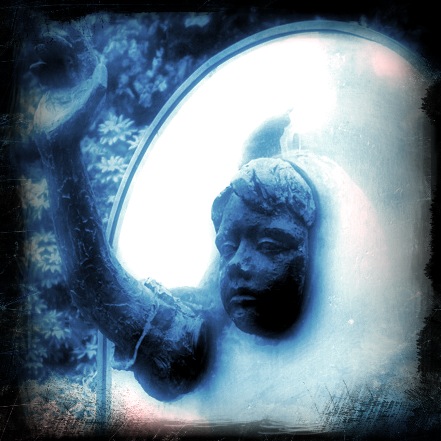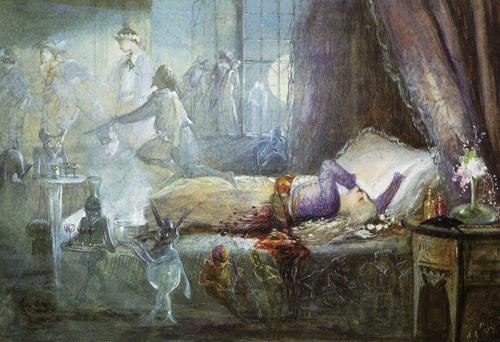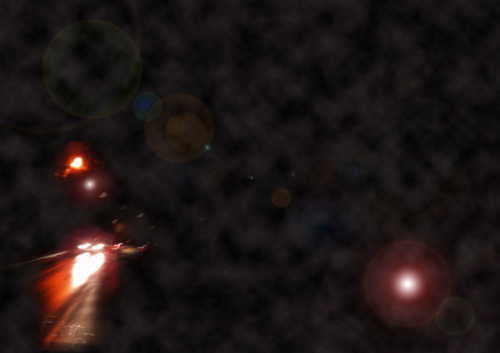 You're tired and have just got into bed...
You're tired and have just got into bed...
You close your eyes and stare at the blackness. Within a few seconds you see random sparks and colour flashes.
You've never really thought about them but if you have you've probably assumed that they're just the random firings of your tired optic nerves as they relax after a hard day.
It looks as if you're drifting through space floating past random galaxies and nebulae.
Then there's a bright flash to the bottom left of your vision, it whizzes off, it must have been a car driving past so, it becomes a car whizzing past on a dark road. Then there's another one. The lights are blurred, maybe it's raining and these are reflections of headlights on the wet road.
Why are you standing beside a road in the rain? Maybe your car has broken down and you are waiting for help. You sense someone behind you. Is it your passenger? Is it a stranger? Are you in trouble?
Fairly frequently, for me, this can evolve into a dream. Although many times these are just fleeting images on a black screen; sometimes they move (like the red blob that became an egg, which then hatched before vanishing) and sometimes they are just static images such as faces or objects. Most of the time the colours are exaggerated and over-saturated.
So what's going on?
My brain is doing what brains do best: it makes sense of the information that it is given. Sometimes it joins the information together to make a narrative, a story. More often than not, in a dream, it does this seamlessly so that you (as the observer, creator and participant of the dream) don't stop to think "Why is there a car driving past in space? Why am I now beside a road?", you just accept it as normal and carry on enjoying the story.
Sometimes as I watch the flashes and sparkles I am pretty much awake, certainly conscious. I am able to question those things and soon realise that the only way that I could have been in one place then magically transported to another place is if I am dreaming.
That's when sometimes I can separate out the creator / observer / participant aspects and consciously create the dream. This is called Lucid Dreaming.
I find that if I concentrate on the images as I fall asleep then as soon as I become conscious of them becoming a story that I wake up, almost as if that kick of consciousness drags me back to the waking world.
Or maybe this has happened to you...
You start to drift off to sleep when all of a sudden you hear your doorbell ring.
You jump up to answer the door only to find that there's no one there. So you go back to bed.
No sooner have you start to doze again than you hear another ring of the doorbell, but this time something is different - it's not YOUR doorbell, it sounds different. You sit up startled, and look around the room before getting back into bed.
Eyes closed, and then the phone rings once and stops. Tired, irritated, and a little scared that someone or something is playing tricks on you, you return to sleep.
Doorbells, phones, knocking, people calling your name, even short tunes wake me up, none of which are real. That is to say that none are generated by external stimuli, they are in fact hypnagogic hallucinations, and to the brain they are very real.
To be more precise, these images and hallucinations can be either hypnogogic or hypnopompic, but they are generally lumped together under the banner of hypnaogic.
Hypnogogic = going into sleep
Hypnopompic = waking from sleep
This is a well documented phenomena, and is nicely illustrated in the book "Head Trip - a Fantastic Romp Through 24 Hours in the Life of Your Brain". The whole book is illustrated in a similar fashion and is well worth a read. Original here: http://www.jeffwarren.org/illustrations/mavromatis’-four-stages-of-hypnagogia
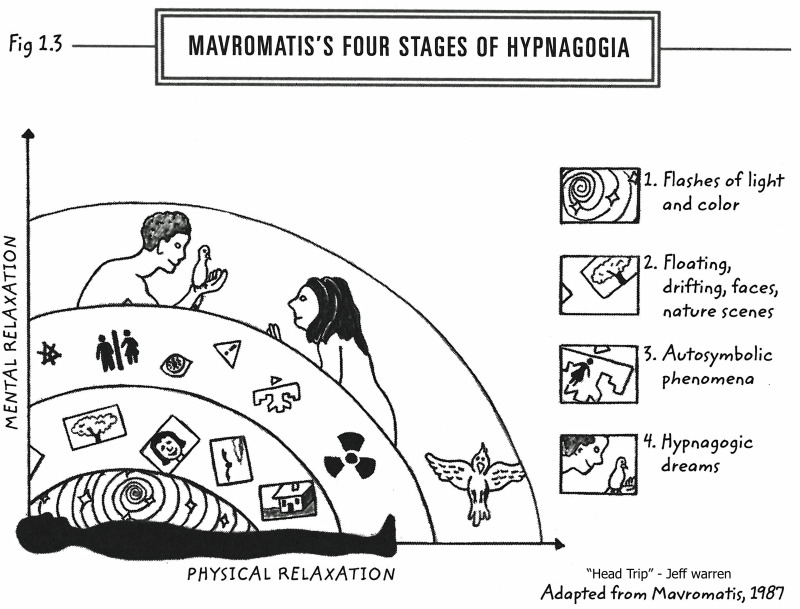
So this is normal. This comes as a relief to me because I first became aware of these flashes and images in my late teens. I'd just started work which involved being on-call, hence my sleep was frequently disturbed and I found it difficult to sleep at night as I was forever listening out for my pager in case I was called out.
I found myself drifting off to sleep at any opportunity during the day, at a desk, in a chair etc. Then when I did sleep at night I had increasing spells of sleep paralysis, so I went to see a doctor and asked if there was anything that could be done to help, such as tablets to help me sleep when I wasn't on-call.
He asked me to describe what went through my head as I tried to sleep at night. When I mentioned the colour flashes he didn't really react, but when I said that I was always tired he decided that I must have "mild depression", he explained that it "wasn't clinical, but it was just being run-down"... and prescribed trycyclic antidepressants.
I clearly remember thinking that this was odd. I didn't feel depressed, just tired. The last thing I said to the doctor before taking the prescription was, "So these colour flashes are because I'm depressed, and these pills will stop them?". To which he replied, "Yes".
The antidepressants made me tired, which did help me sleep at night, but they also gave me disturbed dreams and nightmares and left me feeling even more tired in the day. Not a great solution, and one that I was quick to give up on.
That was nearly 20 years ago, and thankfully awareness of sleep medicine has moved on since then. Nowadays I would hope that most general practitioners would be aware of sleep paralysis and the effect of a disturbed sleep routine on general wellbeing. However, I doubt that many would be aware of the subtleties of Hypnagogia and the normal blurring of states of consciousness that every sleeper goes through on the journey to sleep - despite travelling through them themselves!
As I write this it's occurred to me that the hypnagogic sounds that I normally hear are all things that demand my attention: Phones, doorbell, children calling, explosion outside etc. Only once has it been a few notes of music that didn't cause me to sit bolt-upright in bed.
Maybe this is a hang-up from the being on call nights or having to wake at the drop of a hat to deal with my son's prolonged periods of apnea for many years?
Could it be that over the years a brain learns to be in a "hypersensitive" state, ready to wake up and so is fooled by dream sounds? If so, why would this only happen in REM. This may be similar to Wehr's experiment showing that if a subject expected to be disturbed then the hormone Prolactin wouldn't be released during sleep.
"Wehr quickly discovered that prolactin was vulnerable to almost any disturbance. Simply talking to the subjects would interrupt its secretion, as would their expectation that someone was going to talk to them. It was a fragile state: the subject had to be lying in the dark, expecting not to be disturbed, for the drug to work. But when it did work, it appeared to produce a period of gentle quiescence, a pleasant, meditative state in which time passed very quickly for the subjects.
In addition, each period of quiet rest, wrote Wehr, always emerged directly from “particularly intense” periods of rem sleep featuring vivid dreams, full of emotional resonance."
(Jeff Warren, "Head Trip, a Fantastic Romp Through 24 Hours in the Life of Your Brain)
Hormones aside, I know that certain things that I do can induce these sounds. One example is if I sleep with a fan on in the room. I suspect that this is because the fan generates "white noise" which makes it harder to hear if I am really called in the night, so my brain "plays safe" by alerting me to the dream noises that, if they were real, would demand my attention.
Hypnagogic hallucinations can be actually involve all the senses...
Someone saw the painting of Fuseli's "The Nightmare" on one of my walls and asked me a question. They asked, "Do you ever get walked on at night?". Needless to say this threw me and I wasn't quite sure where they were taking the conversation, but they continued.
They explained that they had been on a holiday in an old stone cottage recently and that during the night they felt as if someone had walked through the room, across the bed and up the stairs in the bedroom.
Already I suspected that this may have been a parasomnia and asked them to tell me more about the day.
I won't recant the whole tale here, but the beginning was enough to confirm that it was a likely hypnagogic episode or even a form of sleep paralysis.
"It'd been a long drive and it was late when I arrived. I made the bed up and got straight it. Just as I was dozing off I felt the bed crumple as if it'd been walked on. I laid there as I heard the footsteps walking up the stairs"
There are several pointers here:
- Strange room
- Tired
- Presence in the room
...and lastly (which is where this blog began)...
- Tired and just got into bed
I'll go into more detail about this type of event when I blog about Sleep Paralysis.
I've got a particular fondness for hypnagogia (thanks to the episode with the doctor) so I tried to capture what is going on when it occurs.
I don't have a full EEG to experiment with, but I do have the raw output from the Zeo's single channel EEG. Although this only looks at the front of the brain (combined with muscle tone and eye movements), it still gives a good guide to what is happening when these episodes occur.
I've concentrated on the episodes that take place in the middle of the night.
When a phantom doorbell rings (or whatever form it takes) then I look at the clock. More often than not I remember the time in the morning and check what the Zeo picked up at that time.
From this data I have learned that most of the hypnaggogic hallucinations occur when I am flitting between sleep stages.
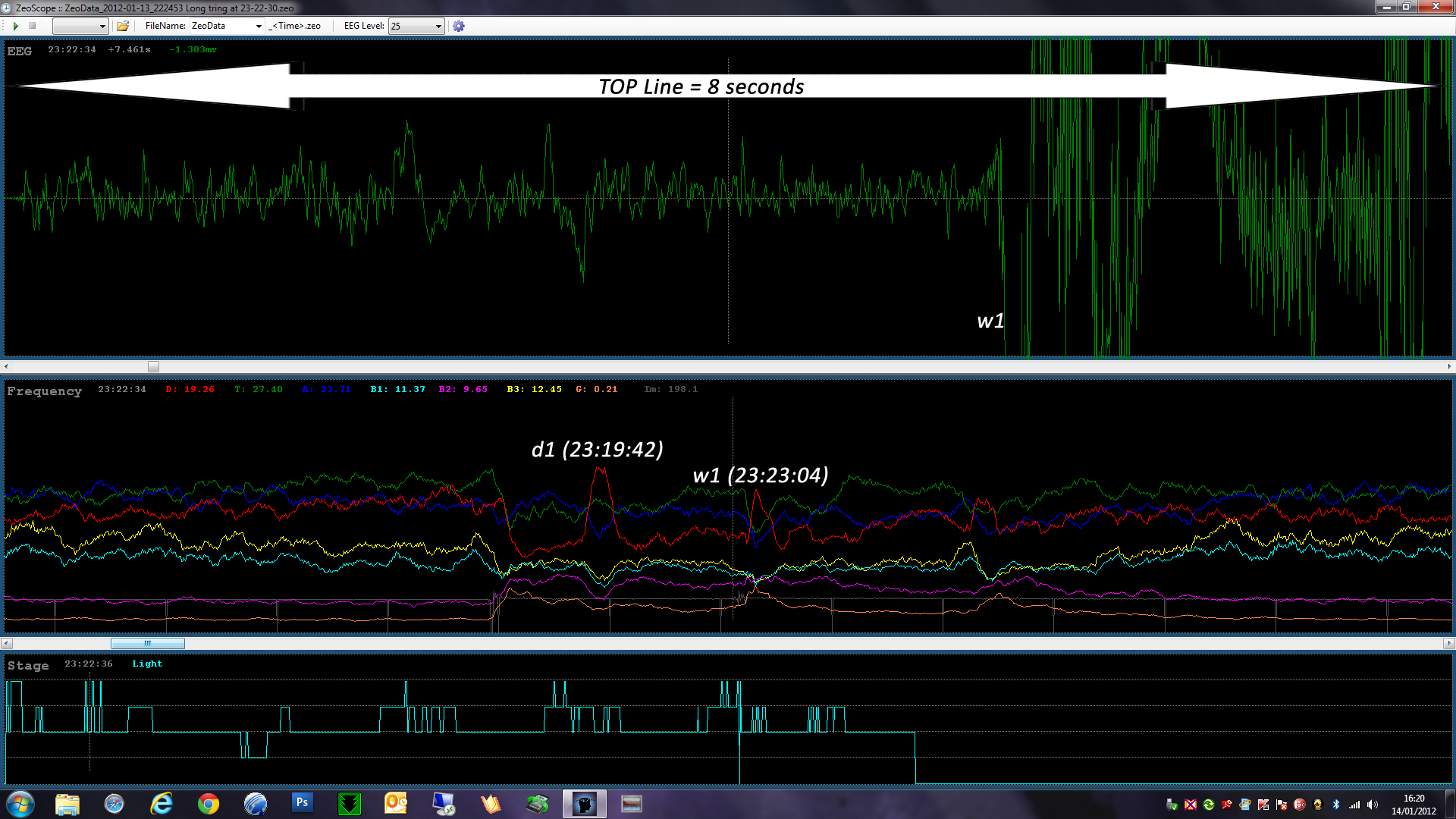
Click for a larger image
The 5 minute eopch of the whole Zeo hypnogram (not shown above) showed me as being awake for this period, which is unsurprising as the live raw data and the 30 second hypnogram showed me as flitting between wake and N1/N2 (and having come from N2 - indicated by sleep spindles).
What isn't clear to me is whether these noises are the cause or effect of sleep state transition. ie, did I wake up then re-doze, dragging some lingering elements of consciousness to the sleeping world with, or did the noise (and presumable unremembered noises cause me to wake up)?
Sadly, without a more precise time that the event occurred and a more detailed EEG I doubt that I will be able find an answer, or be able to point at a wiggly line and say, "THERE is the noise that woke me".
What I can see from looking at the raw data is that the event occurred in the minute of 2322h and I stirred for a moment before looking at the time, resulting in w1 (wake 1 shown by a red peak representing delta waves along with the corresponding mass of noisy delta waves on the EEG line) at 2323:04h.
Interestingly, there is a spike (d1) of delta waves which are much neater in appearance, much like those of slow wave (delta) sleep a few minutes beforehand. This was interpreted as an awakening, but I suspect that it wasn't (it looks too noise-free).
What I'll have to hope for is a more prolonged episode to look at, or perhaps being lucky enough to catch an episode of sleep paralysis whilst I'm recording the raw data.


 Dream,
Dream,  Lucid Dream,
Lucid Dream,  lucid,
lucid,  lucidity | in
lucidity | in  Dreams
Dreams 